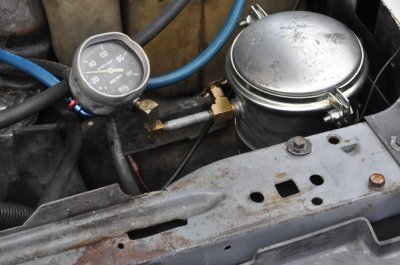Just remember, talking about micron ratings means nothing unless you also talk about the filter's efficiency at those micron ratings. Heck, a screen door is a .5micron filter; it's just not terribly efficient at it.

Mike
The quote of the day.

You can't find an efficiency rating for the Frantz... because there aren't any. It comes empty and you fill it with butt-wipe of varying quality and any efficiency ratings will come from the paper... good or bad. The Frantz was a pretty good setup from it's intro until perhaps the '80s, when better media came to be. Even today, I suppose it's a decent low cost option but it really relies on the paper you install. It's true that the paper can absorb a certain amount of moisture from the oil and even some oxidation residue. That's all good. I only argue the efficiency aspects. Like Mike said, every filter can catch SOME 0.5 micron stuff... might be only 0.1% of the total but some. Heck, I can't imagine how anyone came up with that number since the ISO test equipment I've seen (and I've toured the places where oil filters are built and tested) only can rate down to 3-4 microns.
There are way, way better bypass systems than Frantz. As mentioned, I couldn't find a rated efficiency for the Frantz on the website linked above or anywhere else. One unreadable Blackstone test is all they have there that says I don't know what. Other manufacturers will list efficiency and that's important. If someone can link to some Frantz info, I'll chew on it and either spit it out in disgust or say "yummy!" I know an engineer in the filter biz and I wouldn't be surprised if they have tested a Frantz... so I hit him up for some info and we'll see.
I am running a Racor ABS system, which some of you saw at the last IDI meet last year. It has filter elements that are absolute at 3, 5 or 10 microns (your choice). "Absolute" means it will catch 99 percent of everything that size or larger and the rating is based on a scientific, industry standard test. The elements are similar to the concept the Frantz system uses, i.e. rolled cellulose "paper", but it's special paper that is compressed into a progressive density media.
The best place for a return is one of the special ports in the front of the block for that purpose. They are just below the deck. The canister should include an orifice to control oil flow. For our engines you'd want around 0.040" on the outlet side of the canister.
Finally, don't fall for the schmooze that bypass filtration reduces engine wear in a big way versus a good primary filter and regular oil changes alone. It doesn't. At least not in the short term. It's main value is as an oil life extender and that's where it pays off. With a good bypass, the cleaner oil can stay in service longer because the additive package is not challenged as much and can last longer. Not usual to see OCI 2-4 times longer than standard... and it perfectly safe to do so.
Given similar contamination inputs and operational parameters, the payoff in lower engine wear only comes well into the six figure mileages. That's a payoff that comes mainly for the trucks that are on the road constantly and rack on the miles really fast... like an OTR semi. In other words, the average truck that racks on 2-300K before being retired will have rotted into the ground (or some other major catastrophe has occurred before the investment in the bypass has paid for itself via miles driven. Mainly, you are leaving a great engine for some other guy at the pic-n-pull to pull out of your truck's rusty carcass.
The other time a bypass can pay for itself is a particularly dirty environment. Especially if the truck has marginal air filtration. The intake system is how most of the contamination finds it's way into the crankcase. When that aspect is neglected, wear is increased but if a bypass filter is installed, it helps catch the contaminants before they do too much harm. In that case, it's not so much a case of decreasing wear but preventing MORE wear. I don't have specifics on our engines but generally the amount of wear metal an engine generates in service is quite small. Unless you add a bunch of junk that increases wear... like a few dozen grams of dirt from the cheapass air filter you installed. I have asked for an average engine contaminant generation rate from various industry people and they don't have one. If it's ever been tested, it would be specific to one engine in a particular situation. The only answer I get is "low" with the caveat that "low" only applies to engines with efficient air filtration systems. When asked how much the average oil filter is at the end of an OCi, these same engineers stated they didn't know because it's never been tested. Because they've see a lot of oil filters, I asked for an educated guess and most said 5o% or less. From the specs I've gathered, the average sized car oil filter can hold 16-18 grams. Ours could be nearly double that, more with the PSD filter Some premium (syn) car filters can hold around 30 grams before nearing their bypass limit. If your engine generated 30 grams of wear metal (just over an ounce) in a normal OCI, you'd have a lot more to worry about than how much the oil filter holds.



